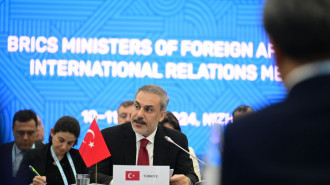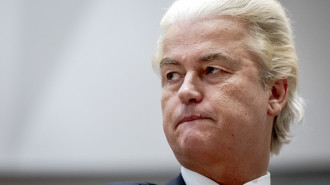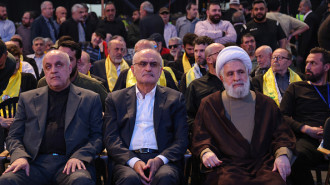Three Palestinian teens killed in Israeli strike buried in Gaza
Three Palestinian teens killed in Israeli strike buried in Gaza
Three Palestinian teenagers killed in an Israeli air strike were buried on Monday.
4 min read
The boys' bodies were wrapped in Palestinian flags (Getty)
Hundreds of Palestinians on Monday laid to rest three teenage boys killed in an Israeli airstrike, with their families insisting they had no militant ties as mourners called on Gaza's groups to retaliate.
The deaths a day earlier of the teens — ages 13 to 15 — threaten to plunge the area into further violence after a brief exchange of fire over the weekend. The Israeli army struck 80 targets in Gaza in response to the heaviest rocket salvos from the Hamas-ruled territory in months.
The boys' bodies were wrapped in Palestinian flags and carried by mourners who shot in the air as they chanted "God is Great."
Aisha Abu Daher said her 13-year-old son Abdel-Hamid had "nothing to do with resistance," referring to the militant factions. Abdel-Hamid and his friends drank tea in the afternoon and rode a donkey cart, a daily habit, and did not come home, she said.
"I went to a wedding, and in the evening I worried when he did not return," she said over the phone from her home in the central Gaza Strip, about 1 kilometer (a half mile) away from the border area. "I don't know why they went or what they were doing there, but I'm sure they were not doing anything bad."
The three boys all lived in Wadi al-Salaqa, a farming village in central Gaza near the Israeli border.
Residents said Abu Daher had dropped out of school and hoped to become a car mechanic. His friend, 15-year-old Mohammed al-Satari, fixed bikes for neighborhood children to earn money to feed pigeons he raised on the roof of his family's home. Khaled Abu Isied, 14, used to collect grass and other feed for livestock his family kept in their backyard.
Residents said children often go to the border area to plant traps used to catch birds, to forage for food for livestock or tend to crops.
"It's normal for them to go there, and that's why we did not expect them to be martyred," said Salwa Abu Isied, Khaled's mother. She said she had no idea that anything was wrong until she received a phone call from the hospital that her son had been killed.
Medics said they recovered the bodies 200 meters (yards) from the border, which has been volatile for months as the Islamic militant Hamas group has led protests there demanding an end to a decade-old Israeli-Egyptian blockade on Gaza.
The Israeli military said the teens had attempted to damage the border fence and "were apparently involved in placing an improvised explosive device" near it. The area where the incident occurred has never been used as a site for protests.
"They were there late, and that's why an aircraft hit them," said Fatma Abu Isied, Khaled's aunt. "Is this something that deserves an airstrike?"
Omar Shakir, Human Rights Watch director in Israel and the Palestinian territories, said the killing of the boys appeared to be a violation of human rights law.
"Army or states can use lethal force only when there is an imminent threat to lives," he said. Entering a restricted area along the border, or even planting explosives there, "doesn't mean someone's life is at imminent threat," he said.
UN Secretary-General Antonio Guterres "deplores" the deaths of the three Palestinian children, a spokesman said.
"The targeting of children or exposing them to risk leading to violence is utterly unacceptable," Stephane Dujarric said. The secretary-general "appeals to all to refrain from any act that could lead to further casualties, in particular any measures that could place children in harm's way."
Hundreds of Palestinians took to the streets Sunday night, burning tires and demanding Gaza militants fire rockets into Israel in retaliation. The sit-ins went on through dawn Monday.
Thousands gathered Monday on the beach for a Hamas-led protest against the blockade. Several threw rocks and firebombs at the fence near the beach in northwestern Gaza. The Gaza Health Ministry said a 27-year-old Palestinian was shot dead during the protest.
Egyptian mediators have been working to restore calm, and hope to bring about national reconciliation between Hamas, which seized Gaza by force in 2007, and the West Bank-based administration of President Mahmoud Abbas.
Hamas says the blockade must be lifted first and has vowed to continue the weekly protests, in which more than 160 Palestinians have been killed since March. A Palestinian sniper killed an Israeli soldier in July.
Israel accuses Hamas of using the protests as cover to stage border infiltrations and attacks. It says it is defending its border and accuses Hamas of exploiting young protesters.
The deaths a day earlier of the teens — ages 13 to 15 — threaten to plunge the area into further violence after a brief exchange of fire over the weekend. The Israeli army struck 80 targets in Gaza in response to the heaviest rocket salvos from the Hamas-ruled territory in months.
The boys' bodies were wrapped in Palestinian flags and carried by mourners who shot in the air as they chanted "God is Great."
Aisha Abu Daher said her 13-year-old son Abdel-Hamid had "nothing to do with resistance," referring to the militant factions. Abdel-Hamid and his friends drank tea in the afternoon and rode a donkey cart, a daily habit, and did not come home, she said.
"I went to a wedding, and in the evening I worried when he did not return," she said over the phone from her home in the central Gaza Strip, about 1 kilometer (a half mile) away from the border area. "I don't know why they went or what they were doing there, but I'm sure they were not doing anything bad."
The three boys all lived in Wadi al-Salaqa, a farming village in central Gaza near the Israeli border.
Residents said Abu Daher had dropped out of school and hoped to become a car mechanic. His friend, 15-year-old Mohammed al-Satari, fixed bikes for neighborhood children to earn money to feed pigeons he raised on the roof of his family's home. Khaled Abu Isied, 14, used to collect grass and other feed for livestock his family kept in their backyard.
Residents said children often go to the border area to plant traps used to catch birds, to forage for food for livestock or tend to crops.
"It's normal for them to go there, and that's why we did not expect them to be martyred," said Salwa Abu Isied, Khaled's mother. She said she had no idea that anything was wrong until she received a phone call from the hospital that her son had been killed.
Medics said they recovered the bodies 200 meters (yards) from the border, which has been volatile for months as the Islamic militant Hamas group has led protests there demanding an end to a decade-old Israeli-Egyptian blockade on Gaza.
The Israeli military said the teens had attempted to damage the border fence and "were apparently involved in placing an improvised explosive device" near it. The area where the incident occurred has never been used as a site for protests.
"They were there late, and that's why an aircraft hit them," said Fatma Abu Isied, Khaled's aunt. "Is this something that deserves an airstrike?"
Omar Shakir, Human Rights Watch director in Israel and the Palestinian territories, said the killing of the boys appeared to be a violation of human rights law.
"Army or states can use lethal force only when there is an imminent threat to lives," he said. Entering a restricted area along the border, or even planting explosives there, "doesn't mean someone's life is at imminent threat," he said.
UN Secretary-General Antonio Guterres "deplores" the deaths of the three Palestinian children, a spokesman said.
"The targeting of children or exposing them to risk leading to violence is utterly unacceptable," Stephane Dujarric said. The secretary-general "appeals to all to refrain from any act that could lead to further casualties, in particular any measures that could place children in harm's way."
Hundreds of Palestinians took to the streets Sunday night, burning tires and demanding Gaza militants fire rockets into Israel in retaliation. The sit-ins went on through dawn Monday.
Thousands gathered Monday on the beach for a Hamas-led protest against the blockade. Several threw rocks and firebombs at the fence near the beach in northwestern Gaza. The Gaza Health Ministry said a 27-year-old Palestinian was shot dead during the protest.
Egyptian mediators have been working to restore calm, and hope to bring about national reconciliation between Hamas, which seized Gaza by force in 2007, and the West Bank-based administration of President Mahmoud Abbas.
Hamas says the blockade must be lifted first and has vowed to continue the weekly protests, in which more than 160 Palestinians have been killed since March. A Palestinian sniper killed an Israeli soldier in July.
Israel accuses Hamas of using the protests as cover to stage border infiltrations and attacks. It says it is defending its border and accuses Hamas of exploiting young protesters.







 Follow the Middle East's top stories in English at The New Arab on Google News
Follow the Middle East's top stories in English at The New Arab on Google News


